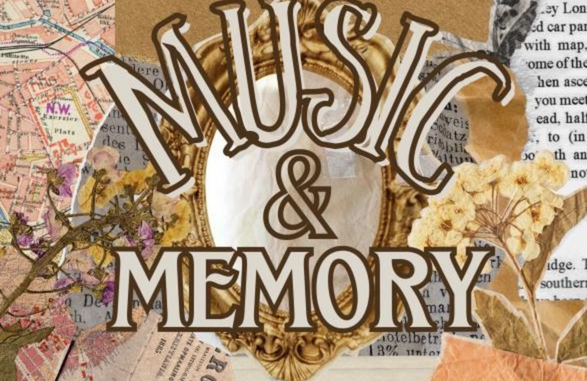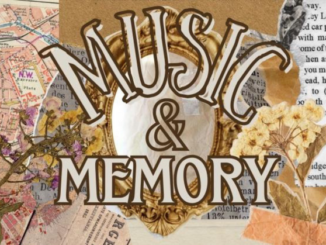
The relationship between music and memory is a universal yet uncanny phenomenon. Somehow, music can uniquely evoke vivid memories, stirring emotions and transporting individuals back to specific moments. I have found in my maturation that some songs are simply too much to take, and I can no longer listen to them. But this is common. Everyone has their own personal, unplayable life soundtrack. Unforgettable hits season mine. Michael Cera Palin’s cover of “If It Makes You Happy” is selfishly sleeping on the couch of my mind. Human lives can be organized and sorted like well-oiled V•Stocks. We catalog our lives in records. It’s a reminder of the power of music and how it can evoke emotions and memories that stay with us long after the song is over.
Sound comes from vibrations, and music is the organization of these vibrations. So tell me why the air shaking violently is causing me to relive the Scholastic Book Fair so vividly. And why do these specific vibrations dance to the tune of “Doesn’t Remind Me” by Audioslave? I don’t enjoy listening to my ‘Liked Songs’ on shuffle. When doing so, I am at the mercy of memory’s unleashed dogs.
On the other hand, I have created time capsule playlists embodying all the fervor of being fourteen and sad. We prefer to experience memories through music only when we have power over the play button. I have found I am not alone in this push and pull. The desire to both hide from and choose to experience these memories is shared, but why?
And what am I supposed to do about it?
Modern Baseball is neurologically emblazoned over my first dances and last goodbyes. I cannot listen to “Tears Over Beers” without feeling sick. Is music supposed to be overwhelming? Is that the whole point of art? Maybe it is a question for my therapist, or perhaps there is a real reason why this happens. Either way, recently, I have been unable to shake the mystery of why music is so memorable.
“Characterisation of Music-Evoked Autobiographical Memories” is a study by the University of California, Davis Graduates Petr Janata, Stefan T. Tomic, and Sonja K. Rakowski, published in the scientific journal Memory (2007). The study examines how music with significant ties to a memorable past event can take the listener back to that time and place. Researchers presented the subjects with a set of short musical excerpts. According to the authors, an average of 30% of songs evoked personal memories. Most of the songs also coaxed out strong emotions. Researchers found that these intense emotions act as memory enhancers: they work to preserve our memories. Certain melodies can serve as auditory time capsules. The music captures the emotions, people, and events. The stronger the feeling, the stronger the memory.
Music triggers individuals to have powerful recollections of events from their adolescence and early adulthood. According to the Washington Post article, “Why Do You Like the Music You Like? Science Weighs In.” by Nayantara Dutta (2022), this is because, during your youth, you’re actively forming musical preferences. The enduring relationship between adolescence, music, and memory enriches personal narratives and displays how emotion impacts our brains. When met with this information, I did what any emotionally stable young person would do: I called my best friend, Amaya Hill. I asked what song, if any, brought intense memories for her. She replied with “Remember When” by The Wallows. She says. “It’s just one of those songs that, even the first time I heard it, made me feel such an intense emotion. Every time I listen after I can’t help but feel deeply” I recalled when she introduced me to it: we cried in my car the day before we left for college. It’s funny how we shared the tears and now the memory.
When asked if she can no longer listen to any songs, Amaya tells me that “What Once Was” by the band Her’s is a “50/50 shot.” She says, “I associate the song with the death of my close friendships.” I spent my adolescence attached to Amaya’s hip, and she played “What Once Was” constantly when we first met. The song always floods me with love for our friendship. I never realized that this piece, which brings love to me, caused her pain. Our shared experience with this song was much different.
“There was a period of my life that music was definitely something I had to rely on to cope,” Amaya continued. “Now that things have calmed down and my relationships are strong, I can just enjoy music.” She tells me that her musical experiences these days are not so intense. “But that is okay. I am casual now. I am content. Happy even.” Amaya reminds me that listening to music doesn’t always have to be a walk through memories. She clarifies that it can even be its own “enjoyable experience” but that “[…] some things will always ache.”
I wondered if this was true for everyone; if we all held personal ‘no play’ lists of songs that we avoid to live happy and content lives. Should we ignore the fact that we are collages of all we have ever loved? Maybe music always asks us to feel deeply, but we ignore it. Some days, getting to work on time is more important than reflecting on my fragile humanity. I’m already five minutes late; I am not trying to relive my last breakup to the tune of “Ex-Factor” by Ms. Lauryn Hill.
I wondered if we could still enjoy music without allowing ourselves to be flooded by emotions (or is that the fun part?). And if so, would it be worth listening to? Is rhythm without memories, without emotion– a placid or pleasant rhythm– still definable as the experience we’ve deemed ‘music’?
I asked my peers the simple question: “Do you associate any strong emotions with music?” Of the ten people I asked, ten answered “Yes.” When I asked the same people if they avoided songs or artists because of unbearably strong emotions, all affirmed it. This supports my theory that most of us have unplayable mythical mixtapes hidden in our minds.
So, here’s my memory mixtape: a compilation of personally gut-wrenching vibrations. Each serves as a sonic time machine, transporting me to bitter and sweet moments. I hope you all enjoy it, as I definitely will not be listening alongside you. As the curator of your life’s playlist, I invite you to share your story through song. Send your memory mixtapes to us directly using Instagram or TikTok, where you can find the station at 88.7 KTRM-FM [@ktrm_fm]. These songs may be overwhelming, but remember that each beat is a testament to the richness of your experiences. While mostly unplayable, the mixtapes of our lives are a source of pride and power, an anthology of individuals. They solidify the simple yet profound fact: you are alive.
No. 1 26 by Paramore
No. 2 Yellow Ledbetter by Pearl Jam
No. 3 Doesn’t Remind Me by Audioslave
No. 4 All My Love by Noah Kahan
No. 5 I Know It’s Over by The Smiths
No. 6 Can’t Hardly Wait by The Replacements
No. 7 A Different Age by Current Joys
No. 8 Dancer in the Dark by Current Joys
No. 9 American Honey by Current Joys
No. 10 Casimir Pulaski Day by Sufjan Stevens
No. 11 Twin Size Mattress by The Front Bottoms
No. 12 Scott Pilgrim vs. My GPA by Mom Jeans.
No. 13 Age of Consent by New Order
No. 14 The Place Where He Inserted the Blade by Black Country, New Road
No. 15 Vienna by Billy Joel
No. 16 Smking to Dth by Cyberbully Mom Club
No. 17 I’ll Get Over This by Flatsound
No. 18 I Exist I Exist I Exist by Flatsound
No. 19 Champagne Supernova by Oasis
No. 20 Nagoya by It Looks Sad.
No. 21 Obligatory Folk Punk Song by Panucci’s Pizza
No. 22 Fade Into You by Mazzy Star
No. 23 Blackbird by The Beatles
No. 24 Sober to Death by Car Seat Headrest
No. 25 Pictures of You by The Cure
No. 26 Acolyte by Slaughter Beach, Dog
No. 27 Moon Song by Phoebe Bridgers
No. 28 C U Around by PWR BTTM
No 29. Before The World Was Big by Girlpool
No. 30 Banana Pancakes by Jack Johnson
References
Dutta, N. (2022, September 25). Why do you like the music you like? Science weighs in. Washington Post. Retrieved November 14, 2023, from https://www.washingtonpost.com/science/2022/09/25/music-taste-personality-traits/
Janata, P., Tomic, S., & Rakowski, S. K. (2007). Characterization of music-evoked autobiographical memories. Memory, 15(8), 845-860. Taylor & Francis Online. 10.1080/09658210701734593



